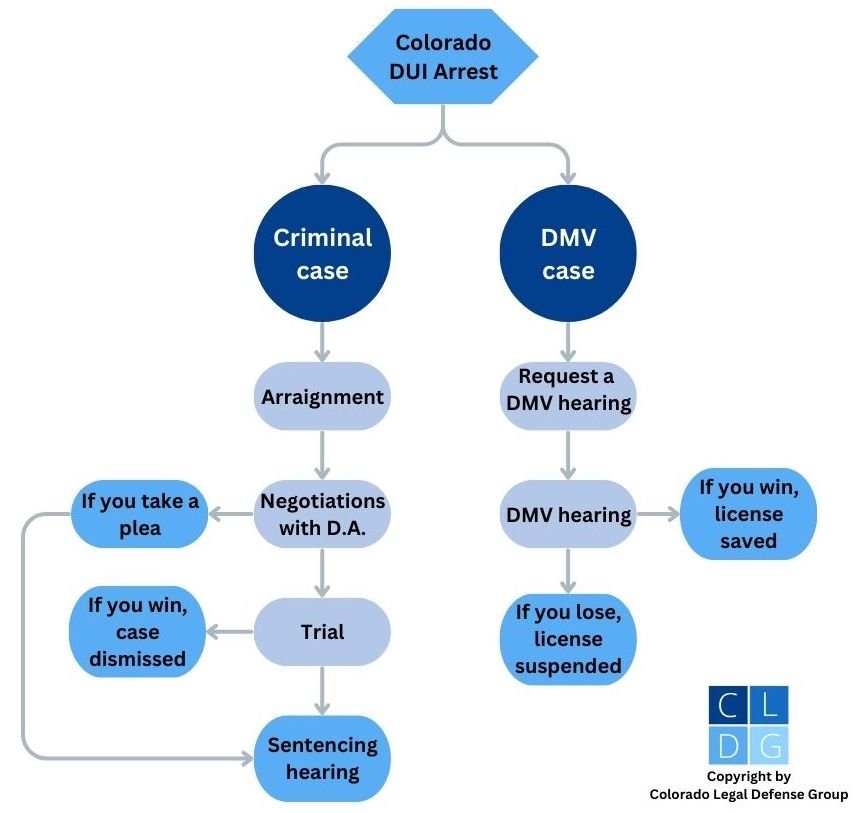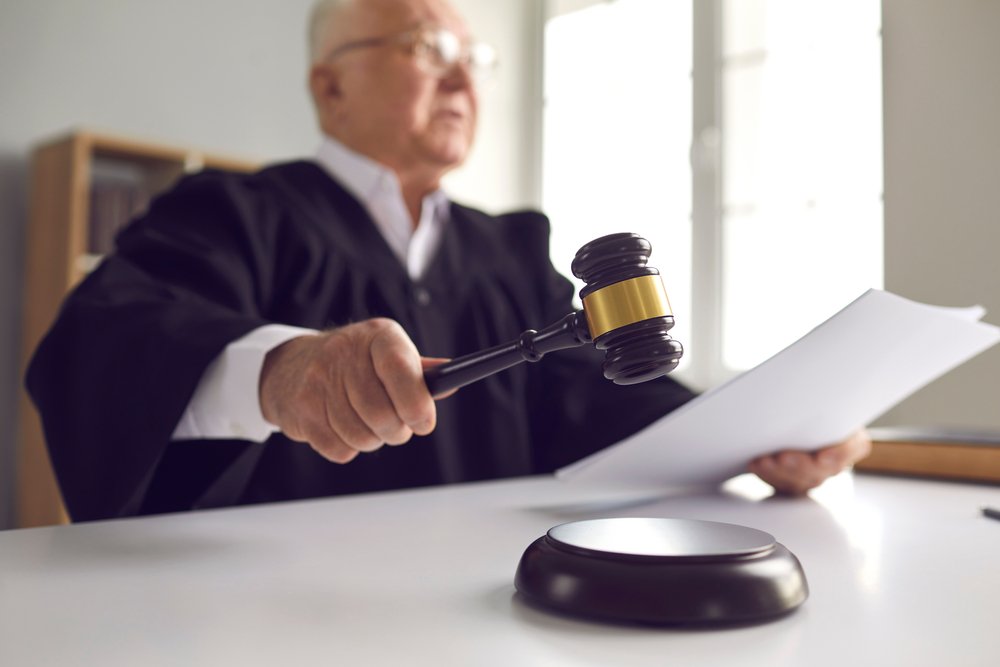The DUI court process in Colorado begins with an arrest. Your first appearance before a judge is usually the arraignment. The court process may continue with
- pre-trial conferences,
- motions, and
- discussing a plea deal.
Your case may go to trial if a deal cannot be reached. Following trial, the judge or jury will find you guilty or not guilty. If you are found guilty, the judge will make a sentencing determination.
The following flowchart summarizes the Colorado DUI case process.

In this article, our Denver Colorado criminal defense lawyers will address:
- 1. After the Arrest
- 2. The DMV Hearing
- 3. The Arraignment
- 4. The Plea Deal
- 5. The Trial
- Additional Resources

Each DUI arrest triggers a criminal case and a DMV case.
1. After the Arrest
After a Colorado DUI arrest, the police officer may take you to the hospital, police station, or sheriff’s station for a chemical test. They may seek a breath, blood, or urine sample to test for the presence of alcohol or drugs in your system.
If you refuse to submit a breath or blood test, you may face additional penalties simply for refusing the test, including losing your license for one year. The police will also get a warrant to force you to submit to a blood test.
Typical Charges
A Colorado drunk driving arrest can lead to various criminal charges depending on your age, your criminal history, and whether you were involved in an accident.
The most common DUI arrest involves a violation of Colorado Revised Statute § 42-4-1301(2)(a), where your blood alcohol concentration (BAC) was tested at 0.08% or higher. This is also known as a per se DUI.
Alternatively, if you had a BAC of less than 0.08% but were impaired to the slightest degree, you may be arrested for driving while ability impaired (DWAI). 1
Other DUI charges include
- underage DUI if you were under 21 and have any alcohol in your system;2,
- commercial DUI if you are a commercial driver with a BAC of 0.04% or higher; 3
- DUI of drugs; 4 and
- DUI causing injury or death.5
Before you are released from jail, the police will provide you a notice to appear in court on your particular DUI charge.
2. The DMV Hearing
If you took the breath test following your DUI arrest – or you refused to submit to a test – the police will usually confiscate your license and issue you an Express Consent Affidavit and Notice of Revocation. If you willingly submitted to a blood test, you usually get to keep your license for the short term until you receive an Express Consent Affidavit and Notice of Revocation in the mail a few weeks later.
The Express Consent Affidavit and Notice of Revocation serves as a temporary license and notice of an upcoming revocation of your driving privileges. If you wish to contest your license suspension, you have only seven days from getting this notice to request a DMV hearing with the Colorado Division of Motor Vehicles (DMV).
If you do not make a request for a hearing within seven days, your driving privileges will be revoked on the eighth day following the Date of Notice. If you request a hearing, you may be issued a temporary driving permit to extend your driving privileges until you have the DMV hearing.6
How The Hearing Works
A DMV hearing – which is completely separate from your DUI criminal case – is an administrative procedure where you or your attorney can challenge:
- whether the officer had a valid reason to stop your vehicle,
- whether there was probable cause to arrest you, and
- whether you had a BAC over the legal limit.
If you win, you get to keep your license. Otherwise, your license will be suspended. Most first-time DUIs in Colorado carry a nine-month license suspension, though you can usually continue driving right away with an IID-restricted license.
DMV hearings are actually more difficult to win than criminal trials because there is a lower burden of proof the state has to meet.7

Jury trials are usually less difficult to win than bench trials.
3. Arraignments
The arraignment is where your criminal court process begins. The judge will advise you, the “defendant”, of your criminal charges. You then plead either:
- guilty,
- not guilty, or
- “no contest.”
By pleading guilty, the judge will impose a sentence, which will end the court process. If you plead not guilty – which you should if you want to fight the case – the case will proceed to the pre-trial phase.
At this point, your attorney will get a chance to review all the evidence and documents involved in your case, including a copy of the chemical test results and the police report. This can help them evaluate your case and help you determine whether or not you may want to take a plea deal or take your case to trial.
Note that if you fail to appear at your arraignment — or fail to have private counsel appear for you — you will have a bench warrant issued for your arrest.8
4. Plea Deals
After your attorney
- evaluates the evidence,
- conducts an investigation, and
- files motions challenging the evidence in your case,
your attorney will be able to advise you whether you are likely to lose at trial. If so, you may want to consider taking a plea deal where there is some predictability as to the outcome.
In many plea deals for first-time DUI cases, the judge will waive any jail as long as you complete an alcohol program and remain sober for a year.9
5. Trials
If you decide to forgo any plea deal and go to trial, you can choose between having a:
- jury trial, where a jury determines the verdict, or
- bench trial, where the judge decides the verdict.
Jury trials are usually preferable to bench trials: Judges tend to be more anti-defendant.
You do not have to take the witness stand during your trial. In fact, you do not have to present any evidence at all: The burden falls on the prosecutor to prove your guilt beyond a reasonable doubt. Typical evidence introduced in DUI trials include:
- breath or blood test results;
- officer testimony; and
- footage from the officer’s dasham or body cam.
If you are found not guilty, your case ends. If you are found not guilty, the case proceeds to the sentencing phase.10
Additional Resources
For more information, refer to the following:
- Colorado Drunk Driving Laws – Detailed explanation by Colorado’s Office of Legislative Legal Services.
- The DUI Process – Step-by-step overview by the Colorado DMV.
- Impaired Driving – Safety video by the Colorado Department of Transportation.
- MADD Colorado – Organization devoted to ending DUI, including by presenting victim impact panels.
- Colorado AA – A 12-step program for overcoming alcoholism.
Legal References
- C.R.S. 42-4-1301(2)(a).
- C.R.S. 42-4-1301 (2)(d)(I).
- C.R.S. 42-2-126(2)(c).
- C.R.S. 42-4-1301(2)(a).
- C.R.S. 42-4-1402.
- Alcohol and Drug Related Offenses, Colorado Department of Revenue.
- Same. Colorado Dep’t of Revenue, Motor Vehicle Div. v. Kirke (1987) 743 P.2d 16.
- CRS 16-2-110.
- CRS 42-4-1307.
- C.R.S. 18-1-406. See, for example, People v. Kembel (Colo. 2023) 524 P.3d 18.
